Politics
Trump Liberation Day tariffs to go into effect as markets melt down
Published
1 week agoon
By
Ekwutos Blog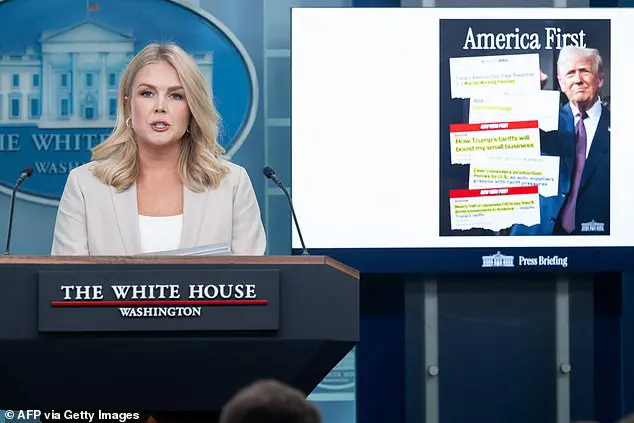
Story by Nikki Schwab, Chief Campaign Correspondent At The White House and Sarah Ewall-Wice, Senior U.S. Political Reporter for Ekwutosblog.com on Capitol Hill and Stephen M. Lepore For Ekwutosblog.Com
President Donald Trump did not want his major tariff announcement to be a laughing matter.
‘I was going to do it April 1st but I said, “I don’t like that date,”‘ Trump said at an event with the nation’s governors in February. ‘I don’t want to take the abuse.’
Still, he flirted with the idea: ‘Should I just do April 1st?’
‘It’s going to cost a lot of money to wait one day,’ he joked.
But then he decided to turn April 2nd into a Trump-branded holiday: ‘Liberation Day’ he dubbed it.
Liberation Day is now set to become the president’s first big event in the White House‘s Rose Garden of his second term. It will take place at 4 pm – to prevent a split screen moment of the announcement coinciding with markets tumbling.
There are still last-minute attempts to steal Trump’s thunder, with multiple Republicans joining Democrat Tim Kaine in a resolution to end the emergency declaration Trump signed in February to implement tariffs on Canada as punishment for not doing enough to halt the flow of illegal drugs into the US.
Kentucky‘s Rand Paul – who has vocally opposed the tariffs – is co-sponsoring the resolution and Susan Collins of Maine has already said she will support it. Other Republicans, such as North Carolina‘s Thom Tills, Iowa‘s Chuck Grassley, are considering it, according to Politico.
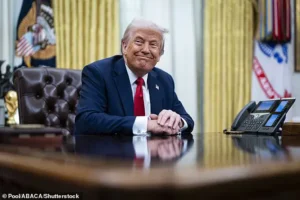
President Donald Trump has coined the term ‘Liberation Day’ for his April 2 announcement of new tariffs. It will mark the first large-scale event in the White House Rose Garden of his second term

Trump is furious at a Democrat bill attempted to cancel out the tariffs already levied on Canada which has gotten support from multiple Republicans, including Susan Collins of Maine (pictured)
Collins already voiced her opposition to the tariffs ahead of Liberation Day.
‘I think imposing tariffs on Canada, which is our closest neighbor, friendly ally, is a huge mistake and will cause disruption in the economies of both countries, particularly for a state like Maine, whose economy is so integrated with Canada,’ Collins told DailyMail.com.
‘I’m not surprised that Canada would seek to strike back, and that’s going to increase costs even more for consumers.’
Trump on Tuesday night raged at Paul and Collins as well as old rival Mitch McConnell and Alaskamoderate Lisa Murkowski in a late night post to Truth Social.
He said he hopes the gang of four ‘will hopefully get on the Republican bandwagon, for a change, and fight the Democrats wild and flagrant push to not penalize Canada for the sale, into our Country, of large amounts of Fentanyl, by Tariffing the value of this horrible and deadly drug in order to make it more costly to distribute and buy.’
Trump warned that these turncoat Senators ‘are playing with the lives of the American people, and right into the hands of the Radical Left Democrats and Drug Cartels.’
He mocked Kaine’s bill as a ‘ploy’ by Democrats meant to ‘show and expose the weakness of certain Republicans, namely these four, in that it is not going anywhere because the House will never approve it and I, as your President, will never sign it.’
Trump then asked of them: ‘Why are they allowing Fentanyl to pour into our Country unchecked, and without penalty. What is wrong with them, other than suffering from Trump Derangement Syndrome, commonly known as TDS? Who can want this to happen to our beautiful families, and why?’
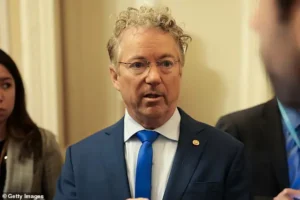
Trump raged at Paul – who co-sponsored Kaine’s bill – and Collins as well as old rival Mitch McConnell and Alaska moderate Lisa Murkowski in a late night post to Truth Social
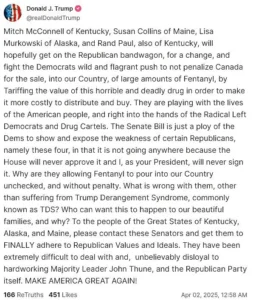
Trump Liberation Day tariffs to go into effect as markets melt down
He then asked his to contact the four Senators to ‘get them to FINALLY adhere to Republican Values and Ideals.’
‘They have been extremely difficult to deal with and, unbelievably disloyal to hardworking Majority Leader John Thune, and the Republican Party itself. MAKE AMERICA GREAT AGAIN!’
Kaine, who unsuccessfully ran for vice president alongside Hillary Clinton against Trump in 2016, said he was happy to allow the GOP the chance to do the right thing and vote down a Trump tariff.
“I really relish giving my Republican colleagues the chance to not just say they’re concerned, but actually take an action to stop these tariffs,” he said.
On Tuesday, team Trump appeared undeterred and ready to go full speed ahead with Liberation Day.
At Tuesday’s White House briefing, press secretary Karoline Leavitt said Liberation Day ‘will go down as one of the most important days in modern American history.’
The Washington Post reported Tuesday morning that Trump was likely to announce an across-the-board 20 percent tariff on most of the nation’s imports.
Mark Zandi, the chief economist for Moody’s, told The Post that if that plan were to go into effect it would almost immediately trigger a recession that would last more than a year, and send the US jobless rate above 7 percent.
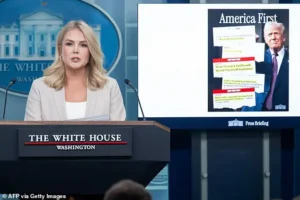
White House press secretary Karoline Leavitt previewed Liberation Day at Tuesday’s briefing, telling reporters that it ‘will go down as one of the most important days in modern American history’
No matter what, it will test whether Trump and his advisers’ worldview on using tariffs to bring manufacturing back stateside is accurate.
Trump’s will-he-or-won’t-he on tariffs have already created stock market turmoil, raised the odds of a recession and started to push up inflation on household items, with economic experts fearing even more price hikes.
Ahead of ‘Liberation Day,’ Trump imposed a 25 percent tariff on steel and aluminum, a 20 percent tariff on shipments from China and up to 25 percent on good from Canada and Mexico that weren’t covered in the Trump-signed trade deal.
Last week Trump announced a 25 percent tariff on foreign cars set to take effect on April 3.
The president has also threatened to slap a 200 percent tariff on all wine and spirits from the European Union after the Europeans announced a planned 50 percent tariff on American whiskey.
That move was in reaction to Trump’s 25 percent tariff on European steel and aluminum.
In addition, he’s flirted with implementing tariffs on agricultural goods, lumber, copper, computer chips, pharmaceuticals.
He proposed blanket tariffs on Colombia – which he dropped.

Traders work the floor of the New York Stock Exchange on Tuesday ahead of President Donald Trump’s major tariff announcement. Stocks opened up low as the market reacted to Liberation Day jitters
Trump also proposed blanket tariffs on the European Union, a top US ally; on Russia, over the war in Ukraine; on any country that buys fuel from Venezuela; and on BRICs nations, for wanting to develop a currency to compete with the US dollar.
Trump has enacted tariffs on $800 billion worth of goods as of March 21, The Washington Post said.
On the eve of Liberation Day, there was global concern about what was coming next.
During the Tuesday press briefing Leavitt wouldn’t confirm the 20 percent figure – but said Trump had made a decision and that the announced tariffs would be ‘effective immediately.’
‘The president said last night he has made a decision and a determination,’ Leavitt said. ‘I don’t want to get ahead of the president.’
‘This is obviously a very big day. He’s with his trade and tariff team right now perfecting it to make sure this is a perfect deal for the American people and the American worker and you will all find out from about 24 hours from now,’ Leavitt said.
On Monday night Trump had also floated ‘reciprocal’ tariffs aimed at countries that currently have steep import taxes on American products – which would represent a less extreme action than imposing a 20 percent tariff across the board.
A lobbying effort has been taking place to swat these down.
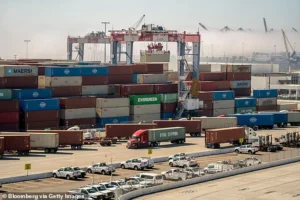
President Donald Trump and his economic advisers believe implementing tariffs on imports will help bring manufacturing back to the United States. Some financial experts are predicting that the use of largescale tariffs will push the US into a recession
Leavitt confirmed that the White House had been fielding calls from ‘quite a few countries that have called the president and have called his team in discussion about these tariffs.’
Even Fox News was skeptical, with Peter Doocy asking what would happen if MAGAnomics was wrong.
‘They’re not going to be wrong,’ Leavitt pushed back. ‘It is going to work and the president has a brilliant team of advisers who have been studying these issues for decades.’
On Capitol Hill, while some GOP senators have defended Trump’s approach to tariffs, others have been hesitant to weigh in.
‘We don’t know what we’re going to see yet, and we’ll just have to wait and see what it looks like,’ said Sen. Mike Rounds when asked about seeking exemptions.
‘Then we can make some determinations, but at this stage in the game, it’s unknown to us,’ the South Dakota Republican said.
If the tariffs do tip the US into a recession there will likely be buyers’ remorse.
Trump was reelected in November after President Joe Biden didn’t do enough to curb inflation in the years following the COVID-19 economic collapse.
The eventual Democratic nominee, Vice President Kamala Harris, didn’t do enough to separate herself from Biden’s economic policies, allowing Trump to argue he was the better-for-the-economy candidate.
The Republicans have full control of Congress currently, but economic grumbling could cost them their majorities in 2026.

You may like
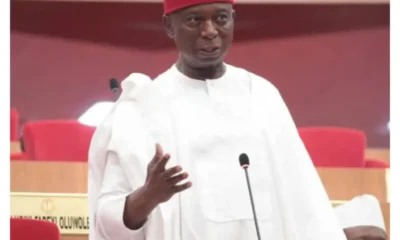

Gov Oborevwori afraid of ‘Anioma State’ — Ned Nwoko


AFDB REAFFIRMS $2.2 BILLION PLEDGE AS VP SHETTIMA COMMISSIONS 2ND SAPZ IN CROSS RIVER ** Says agro-industrial processing zones will empower farmers, attract investors, diversify Nigeria’s economy


Nigerians to start enjoying benefits of lower global crude prices — PETROAN


Owerri correctional facility dispels rumours of attack, jail break
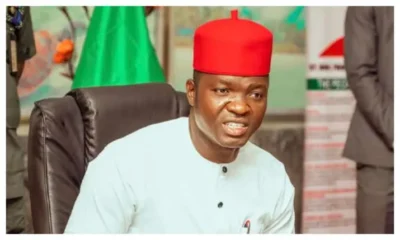

Ebonyi: Amasiri on fire – Lawyer raises alarm over military invasion as communities clash
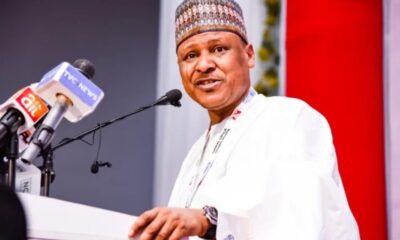

FG woos French investors with economic reforms, market potential
Politics
Gov Oborevwori afraid of ‘Anioma State’ — Ned Nwoko
Published
2 hours agoon
April 10, 2025By
Ekwutos Blog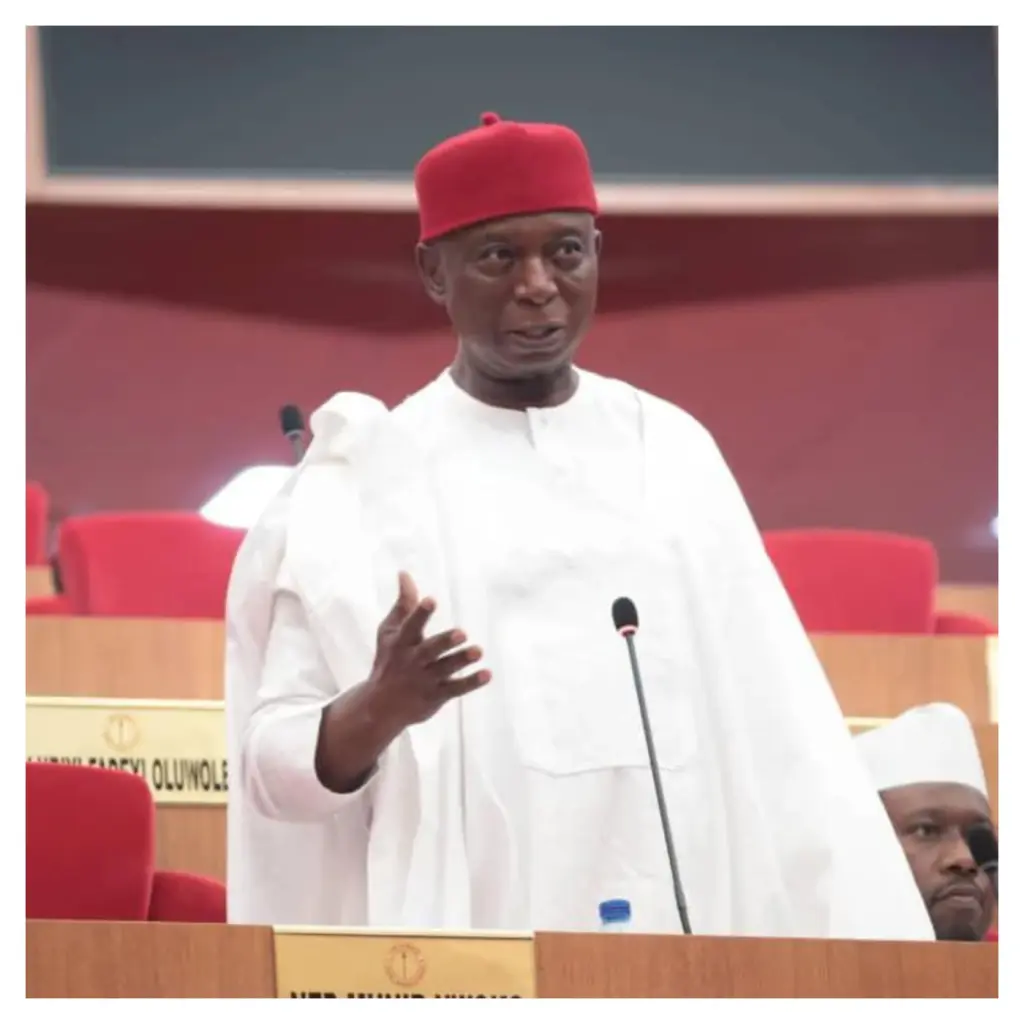
The senator representing Delta North Senatorial District, Ned Nwoko, has disclosed that Governor Sheriff Oborevwori does not understand the benefits of state creation.
He revealed this in Ogwashi-Uku, Oshimili North Local Government Area on Thursday during the APC Women Support Group in collaboration with Rita Daniels Single Parenthood, Girl Child Initiative, and Regina Daniel’s Charity and Development Foundation.
He also confirmed that Governor Oborevwori warned his aides against the projects, turning them into opponents of Anioma State creation, fearing the creation of another state for selfish interests.
The senator, who said the governor told him he would not support the creation of Anioma State, vowed that nothing would stop the creation of Anioma State, not even the governor.
“It is now at public hearing after passing the 2nd reading; then it will be back to the Senate for the 3rd reading and will eventually go to the President for assent.
“From the Delta North first Senator Osakwe, through Nwaoboshi, Okowa, they were all afraid because they don’t want the state to be shared. They don’t know the advantages of state creation, such as two governors, two deputies, more lawmakers, and other developments.
“The only party that will make it happen is APC. If there is anybody in other political parties, it is because of their stomachs, but not for the interest of Anioma people,” he said.
On why he joined APC, Nwoko said he had a meeting on 1st January 2025 with President Tinubu, had meetings with the Senate President and other APC leaders and stakeholders subsequently, who told him that Anioma State creation could only be their project if he joined APC.
“If I am pushing and I have the President with me, wouldn’t I need to join APC? They said it was my project since I was in PDP, but if I wanted it to be their project, I should join APC. I want it to be their project. All APC members on the committee I belong to support Anioma state creation,” the senator stated.
Politics
US Reps passes Trump-backed bill to cut govt taxes, spending
Published
3 hours agoon
April 10, 2025By
Ekwutos Blog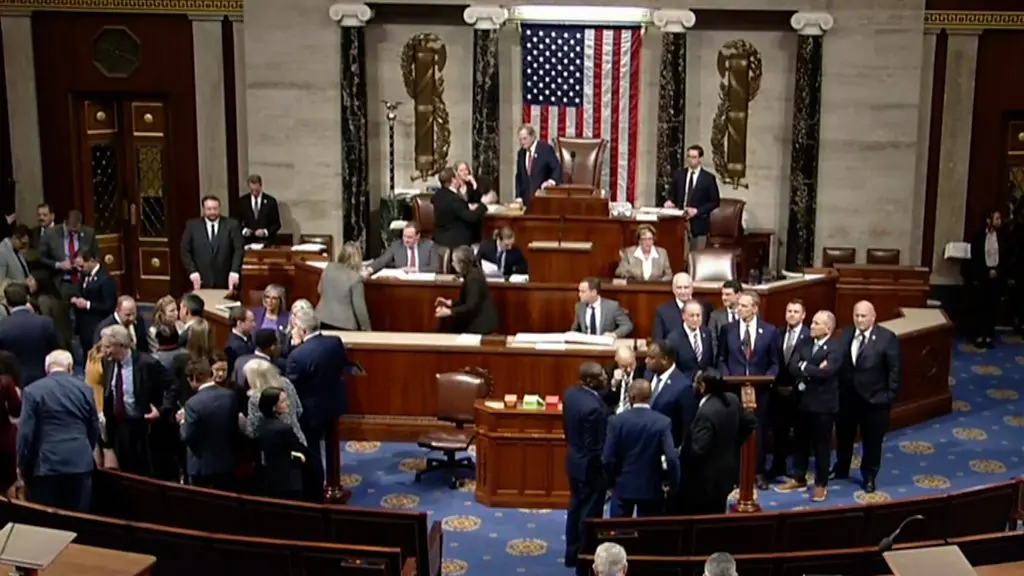
The United States, US, House of Representatives on Thursday passed a budget bill to cut government taxes and government spendings.
The bill was passed despite opposition from Democrats and Republican hard-liners.
BBC reports that the spending plan is key in President Donald Trump’s legislative agenda and he has called it a “big, beautiful bill”.
The bill was passed after 216-214 vote by lawmakers.
Reacting, Trump congratulated lawmakers for the p[assage of the bill.
Posting on social media, Trump wrote: “Congratulations to the House on the passage of a Bill that sets the stage for one of the Greatest and Most Important Signings in the History of our Country.”
However, the House bill has much deeper spending cuts than the version passed by the US Senate, and the two versions must now be merged into one bill for him to sign into law.
The House passed the budget bill mostly along party lines, with all Democrats voting against, along with two Republicans – Thomas Massie of Kentucky and Victoria Spartz of Indiana.
Politics
Presidency unveils committee to trickle down federal policies to community dwellers
Published
4 hours agoon
April 10, 2025By
Ekwutos Blog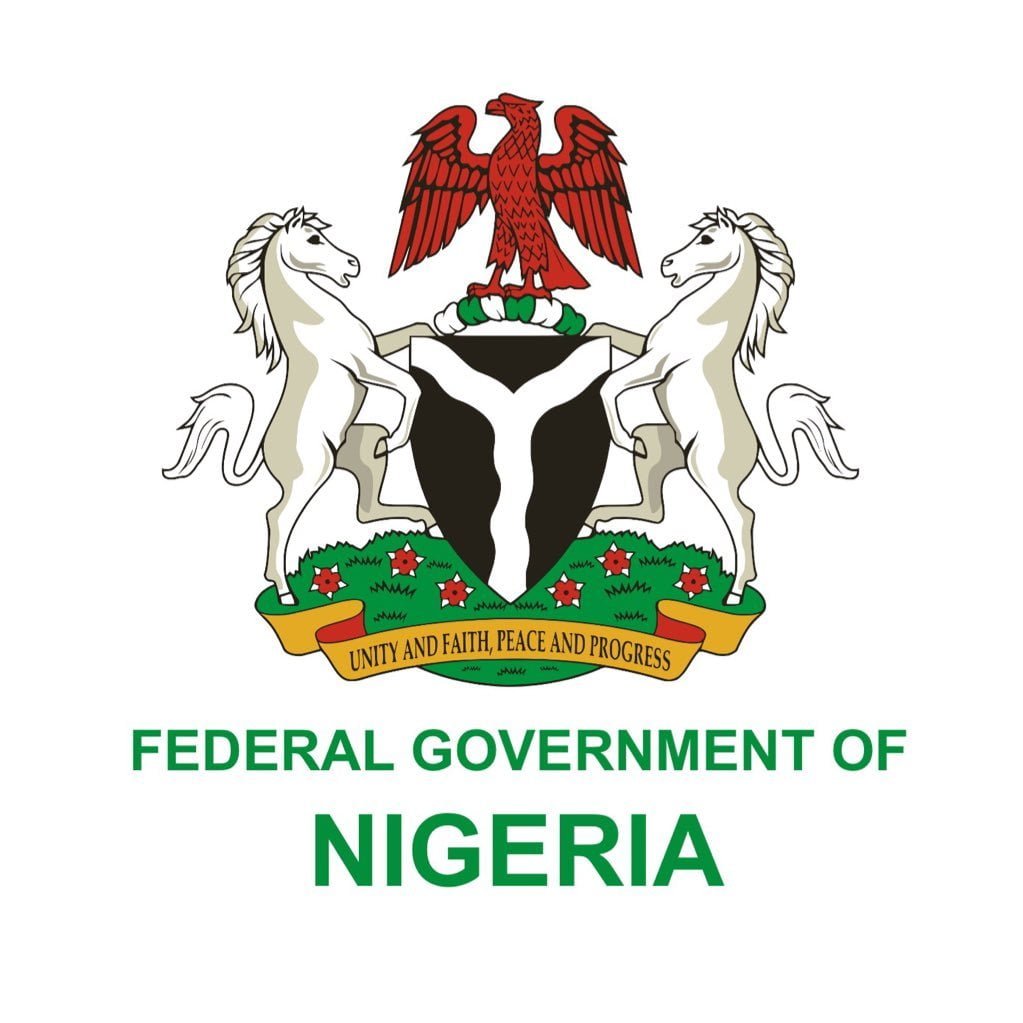
The Presidency on Thursday, took steps to close the gaps in bringing federal policies closer to grassroots communities across Nigeria, with the inauguration of a National Community Engagement Framework Drafting Committee.
After the ceremony held at the State House, Abuja, Senior Special Assistant to the President on Community Engagement (North‑West), Abdullahi Yakasai, said the framework will embody the spirit of partnership and collective action.
Yakasai said, “The framework drafting committee we are launching today embodies the spirit of partnership and collective action, ensuring that progress is shared responsibility.
“Our nation is at an important juncture where every decision must prioritise the wellbeing of our citizens.
“First, you will dialogue and have a meaningful conversation and action. It will present a new chapter in our nation’s history that is built on the principles of inclusivity and equity.”
Senior Special Assistant to the President on Community Engagement North‑Central, Mrs Abiodun Essiet, said the framework would serve as a blueprint for action to ensure that no citizen feels excluded from national decision‑making.
“Today is not just a ceremony; it is a call to serve, to innovate, and to rise to the occasion,” she told committee members and invited dignitaries.
“This framework reflects our collective commitment to make sure no voice is left unheard, no community left behind, and every citizen feels seen, valued, and empowered.”
Essiet urged members drawn from government, civil society, and the private sector to act as “bridges between policy and people,” stressing that their task goes beyond representation to inspiring trust and driving impact.
Under the directive of President Bola Tinubu, the committee will draft guidelines for collaborative governance, inclusive decision‑making, and citizen empowerment, she explained.
Once completed, the framework is expected to formalise channels for regular dialogue between federal agencies and local communities, with the aim of improving service delivery and boosting public confidence in government programmes.
Its first assignments include mapping existing community engagement efforts, identifying gaps, and proposing clear metrics for measuring impact.
Essiet further said the committee would work “with courage, commitment, and clarity of purpose” to deliver results swiftly.
“Nigeria is counting on us. Let us rise to the call,” she concluded.
The State House Permanent Secretary, Temitope Fashedemi, emphasised the importance of the committee’s successful assignment and its impact on communities nationwide.
Represented by the Director, Information and Communication Technology, Lukman Kilani, Fashedemi assured the committee of support to ensure a successful assignment that will positively impact the communities across the country.
A consultant on the project, the CEO at Environmental Harmony Limited, Mrs Kitan Oluwagbuyi, apprised committee members of the task ahead.
Oluwagbuyi said the committee has six weeks to draft the framework.
She explained that the framework is meant to “Provide a structured approach to stakeholder identification, mapping, and engagement.
“Create tools and templates for participatory governance at all levels. Strengthen feedback mechanisms to improve policy implementation and service delivery.
“Enhance government accountability and transparency in community-driven development programmes.”
According to Oluwagbuyi, the opening fortnight will be devoted to stock‑taking.
During this period the framework drafting committee is expected to present a detailed status report, distilling lessons from earlier outreach programmes, while other committee members will lay out their engagement strategies, successes and persistent bottlenecks.
By the third and fourth weeks, external consultants will have drafted the first version of the National Stakeholders’ Engagement Framework and circulated it for line‑by‑line scrutiny by all members.
The final stretch, covering weeks five and six, will see the committee fold comments into a clean text, vote to adopt the document and forward it to the Federal Government for approval and nationwide implementation.
The stakeholders received goodwill messages from the President of the Community Development Practitioners of Nigeria, Prof. Bello Shittu; Professor of Public Policy, Governance and Core Government Functionality at the University of Abuja, Prof. Abdulhamid Ozohu-Suleiman and the Sarkin Bwari, Auwal Musa Ijakolo II.

Gov Oborevwori afraid of ‘Anioma State’ — Ned Nwoko

AFDB REAFFIRMS $2.2 BILLION PLEDGE AS VP SHETTIMA COMMISSIONS 2ND SAPZ IN CROSS RIVER ** Says agro-industrial processing zones will empower farmers, attract investors, diversify Nigeria’s economy

US Reps passes Trump-backed bill to cut govt taxes, spending
Trending

 Trending6 months ago
Trending6 months agoNYA demands release of ‘abducted’ Imo chairman, preaches good governance
- Business6 months ago
US court acquits Air Peace boss, slams Mayfield $4000 fine

 Politics6 months ago
Politics6 months agoMexico’s new president causes concern just weeks before the US elections
- Entertainment6 months ago
Bobrisky transferred from Immigration to FCID, spends night behind bars
- Entertainment6 months ago
Bobrisky falls ill in police custody, rushed to hospital

 Politics6 months ago
Politics6 months agoRussia bans imports of agro-products from Kazakhstan after refusal to join BRICS

 Politics6 months ago
Politics6 months agoPutin invites 20 world leaders
- Politics1 year ago
Nigerian Senate passes Bill seeking the establishment of the South East Development Commission.
